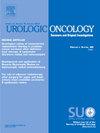Impact of postprogression therapies on overall survival: Recommendations from the 2023 kidney cancer association think tank meeting
IF 2.4
3区 医学
Q3 ONCOLOGY
Urologic Oncology-seminars and Original Investigations
Pub Date : 2025-03-01
DOI:10.1016/j.urolonc.2024.10.022
引用次数: 0
Abstract
Modern advances in systemic and localized therapies for patients with renal cell carcinoma (RCC) have significantly improved patients’ outcomes. If disease progression occurs after initial treatment, clinicians often have multiple options for a first salvage therapy. Because salvage and initial treatments both may affect overall survival time, and they may interact in unanticipated ways, there is a growing need to determine sequences of initial therapy and first salvage therapy that maximize overall survival while maintaining quality of life. The complexity of this problem grows if a second salvage therapy must be chosen for patients with treatment-resistant disease or a second progression occurs following first salvage. On November 9, 2023, a think tank was convened during the International Kidney Cancer Symposium (IKCS) North America to discuss challenges in accounting for postprogression therapies when estimating overall survival (OS) time based on randomized controlled trial (RCT) data. The present manuscript summarizes the topics discussed, with the aim to encourage adoption of statistical methods that account for salvage therapy effects to obtain scientifically valid OS estimation. We highlight limitations of traditional methods for estimating OS that account for initial treatments while ignoring salvage therapy effects and discuss advantages of applying more sophisticated statistical methods for estimation and trial design. These include identifying multistage treatment strategies, correcting for confounding due to salvage therapy effects, and conducting Sequentially Multiple Assignment Randomized Trials (SMARTs) to obtain unbiased comparisons between multistage strategies. We emphasize the critical role of patient input in trial design, and the potential for information technology (IT) advances to support complex trial designs and real-time data analyses. By addressing these challenges, future RCTs can better inform clinical decision-making and improve patient outcomes in RCC.
进展后疗法对总生存期的影响:2023 年肾癌协会智囊团会议的建议。
治疗肾细胞癌(RCC)患者的全身和局部疗法的现代进展大大改善了患者的预后。如果初始治疗后疾病出现进展,临床医生通常有多种选择进行首次挽救治疗。由于挽救治疗和初始治疗都可能影响总生存时间,而且它们可能以意想不到的方式相互作用,因此越来越需要确定初始治疗和首次挽救治疗的顺序,以便在维持生活质量的同时最大限度地提高总生存率。如果必须为耐药患者选择第二次挽救治疗,或在第一次挽救治疗后出现第二次病情进展,那么这一问题的复杂性就会增加。2023年11月9日,在北美国际肾癌研讨会(IKCS)期间召开了一次智囊团会议,讨论在根据随机对照试验(RCT)数据估算总生存(OS)时间时考虑进展后治疗所面临的挑战。本手稿总结了讨论的主题,旨在鼓励采用考虑挽救治疗效果的统计方法,以获得科学有效的OS估计。我们强调了考虑初始治疗而忽略挽救治疗效果的传统OS估算方法的局限性,并讨论了应用更复杂的统计方法进行估算和试验设计的优势。这些方法包括确定多阶段治疗策略、校正挽救治疗效应造成的混杂因素,以及进行连续多次分配随机试验(SMART)以获得多阶段策略之间无偏见的比较。我们强调患者意见在试验设计中的关键作用,以及信息技术(IT)在支持复杂试验设计和实时数据分析方面的潜力。通过应对这些挑战,未来的 RCT 可以更好地为临床决策提供信息,并改善 RCC 患者的预后。
本文章由计算机程序翻译,如有差异,请以英文原文为准。
求助全文
约1分钟内获得全文
求助全文
来源期刊
CiteScore
4.80
自引率
3.70%
发文量
297
审稿时长
7.6 weeks
期刊介绍:
Urologic Oncology: Seminars and Original Investigations is the official journal of the Society of Urologic Oncology. The journal publishes practical, timely, and relevant clinical and basic science research articles which address any aspect of urologic oncology. Each issue comprises original research, news and topics, survey articles providing short commentaries on other important articles in the urologic oncology literature, and reviews including an in-depth Seminar examining a specific clinical dilemma. The journal periodically publishes supplement issues devoted to areas of current interest to the urologic oncology community. Articles published are of interest to researchers and the clinicians involved in the practice of urologic oncology including urologists, oncologists, and radiologists.

 求助内容:
求助内容: 应助结果提醒方式:
应助结果提醒方式:


